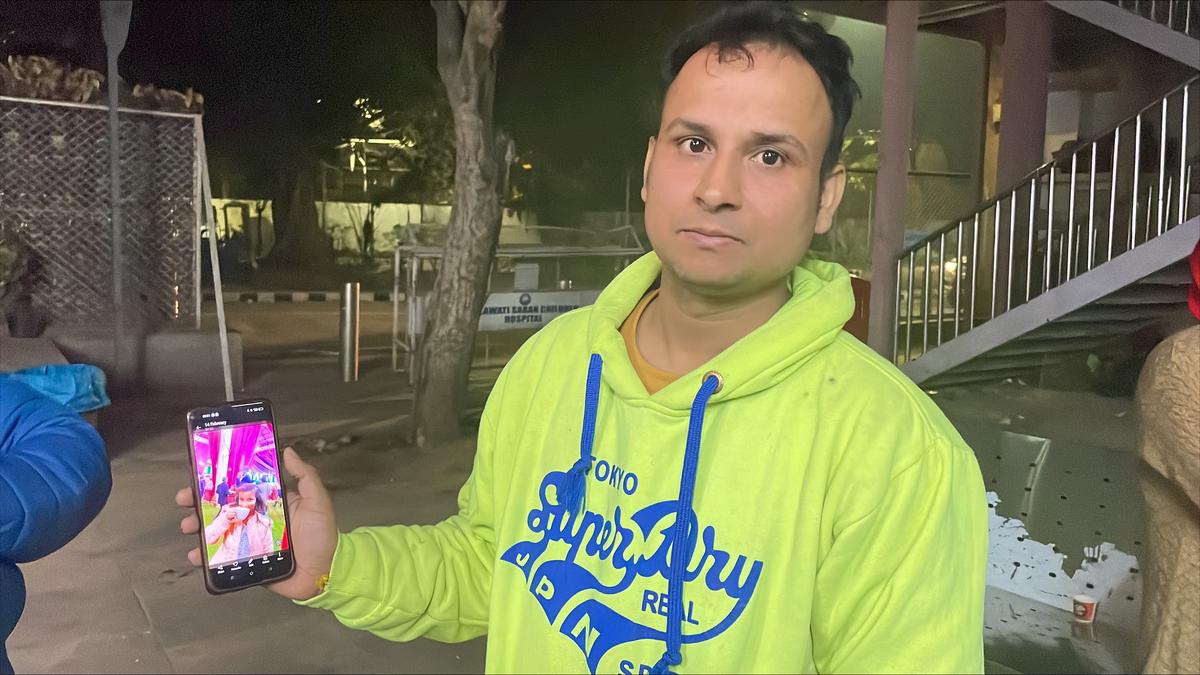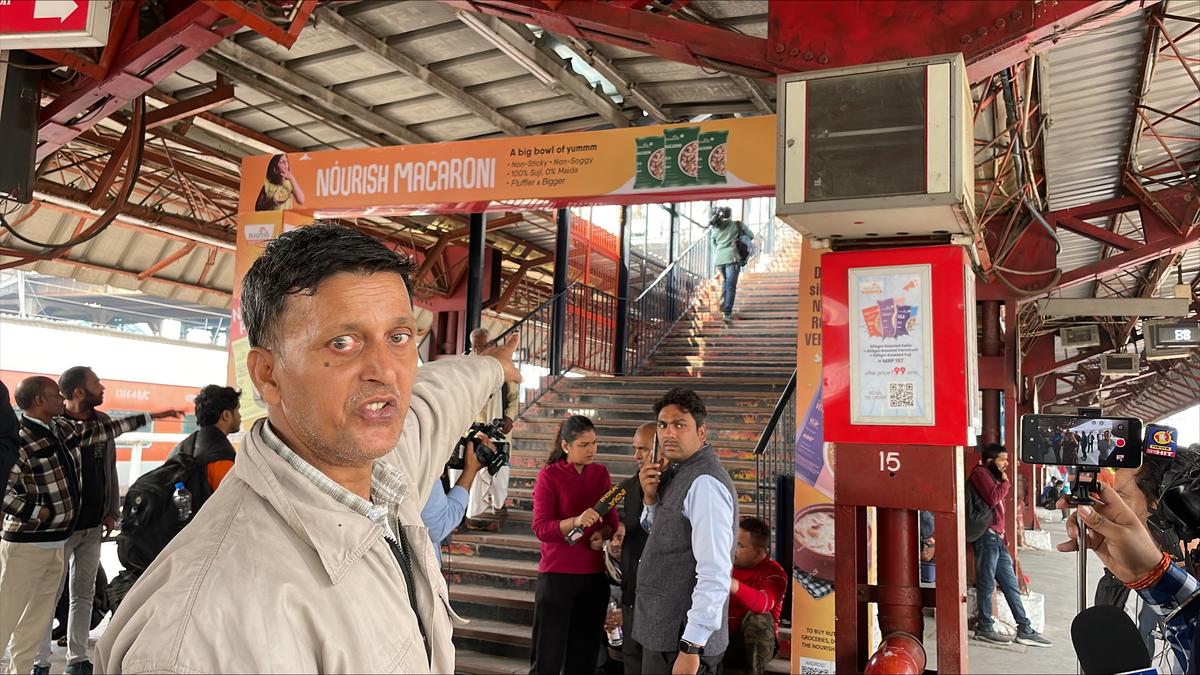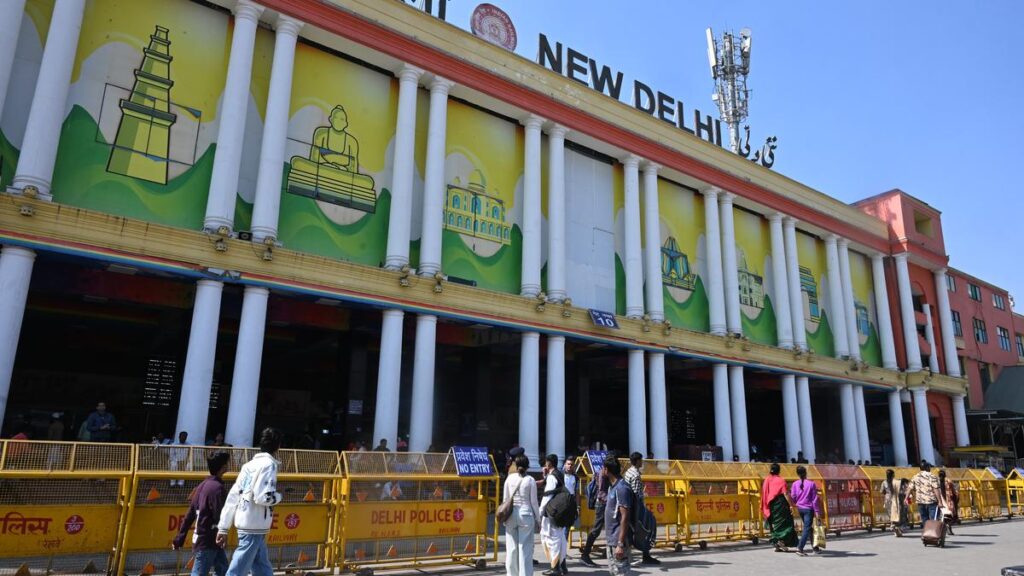Forty-eight hours is a long time to get on with life, especially at the New Delhi Railway Station. On February 17, nearly 48 hours after the stampede that killed 18 people, 52-year-old Rajesh Upadhyay was in a hurry to board a train to Prayagraj, Uttar Pradesh. While platform no. 16 remained crowded, with few signs of the chaos that had transpired two days before, Upadhyay was confident that his good karma would see him through the journey. “I have committed no paap (sin), so I believe I’ll not face any badha (hindrance),” he said, hopping on to an AC 3-tier compartment of the Magadh Express along with his wife and son.
As people continue to head to Prayagraj for the Maha Kumbh, the crowd surge at the railway station has left officials on the ground baffled. If anything, people are in a hurry since the religious fair is coming to an end on February 26, said a railway official.
According to his colleagues, even on February 16, a day after the stampede, 18.48 lakh passengers were ferried to the Maha Kumbh in 388 trains from various States. Till 6 p.m. on February 17, more than 14 lakh passengers were transported in 266 trains. “The Kumbh rush will continue till February 26,” officials told The Hindu.
Upadhyay believes one needs to be fortunate enough to be able to make the trip and take a dip in the “sacred waters” of the Triveni Sangam. “I believe my fate will take me to Prayagraj safely.”
Then there are bigger worries.
Boarding the general compartment of the Shiv Ganga Express, Rakhi Shaw, 27, and her husband Rajat Shaw, 28, didn’t want to back out at the last minute. “Both of us have appeared for government job exams and are awaiting the results. We feel if we take this holy journey together, maybe we can get through this hurdle,” she said.
Of fate and faith
Mira Devi, a 45-year-old resident of Kanjhawala in Delhi, said attending this year’s Kumbh was extremely important for her. “My three children are unemployed. If taking a dip in the Sangam can rid me of my sins and help my children, I’ll take a chance,” she said, adding that she said her prayers before setting out for the station.
Employment was a big reason why Prabhu Shaw, a resident of Motihari in Bihar, also sent his 18-year-old daughter Baby Kumari to live with her uncle’s family in Delhi. Kumari was headed to Prayagraj along with her uncle, aunt, and cousin when they were caught in the stampede. While Kumari died, her cousin Khushi and aunt Sharda Devi were injured in the incident.
“My parents, Baby didi, and I were travelling together from Delhi, while our relatives from Bihar were supposed to meet us at the Prayagraj station,” recalled Khushi.
While all three left their rented accommodation in Delhi’s Bijwasan on February 15 together, by the end of the night, Kumari’s body, wrapped in white sheets, was sent to her village in Bihar along with ₹10 lakh in cash and police protection.
Prabhu doesn’t want to blame anyone and claimed it’s God who snatched his daughter away. “Punya kamane ja rahi thi, par kismat ko manjoor nahin tha (She was going to receive blessings, but was not destined for it),” he said, adding that he had sent his child to Delhi to pursue higher education so she could secure a job.
“We have spent all our lives here in the village but she wanted to go to college in Delhi and land a decent job. Today, we have ₹10 lakh. It’s nothing compared to my daughter’s life. She was my budhape ka sahara (support in old age). Now that she is gone, maybe I’ll keep this money aside in her memory… maybe it will help us in our old age,” he told The Hindu.
However, her aunt blames the railway officials and the government. “If you know that the trains are packed, then why sell more tickets?” a visibly angry Sharda said.
Mohit Malik, husband of Sangeeta Malik, one of the 18 killed in the stampede, also feels the railway officials were at fault. “Why boast that you have provided special trains when there is no space for people to even stand inside them? Why continue to sell tickets when you can clearly see that the stations are overcrowded?” said the resident of Mundhal in Haryana.
Talking about the instant ex gratia payment to the families of the deceased and the injured in cash, he wondered if the money could bring his wife back to life. “Then what good is it for? Is this the price of a life, or to buy people’s silence?”
Hours after the stampede, the Railways, in a statement, said it paid ex gratia of ₹10 lakh to the kin of the 18 deceased. It distributed ₹2.5 lakh to the grievously hurt and ₹1 lakh to those with minor injuries among the 15 injured.

Opil Singh showing a photograph of his 7-years-old daughter who was killed in the stampede.
| Photo Credit:
ALISHA DUTTA
According to a 2023 guideline of the Railway Ministry on ex gratia relief, up to “₹50,000 [is] to be paid in cash as immediate relief”. The rest of the money has to be paid by “account payee cheque/RTGS/NEFT/any other online payment mode”.
Officials clarified that the ex gratia for the February 15 incident was given in cash because of “extraordinary circumstances”.
The 2023 guideline, they said, is “routine and applies to normal incidents”. The February 15 incident was an extraordinary situation. Even in earlier incidents, cash had been distributed as it became cumbersome and time-consuming to gather bank account details, while cash could be used instantly during the crisis, they added.
The Railways distributed nearly ₹2 crore in cash as compensation following the stampede to victims and their families.
“How does all that matter,” said Opil Singh, 32, a resident of Delhi’s West Sagarpur. Just after losing his seven-year-old daughter, Singh found himself standing in front of TV cameras at Lady Hardinge hospital as eager reporters thrust their microphones in his face.
As he opened his mouth to speak, a policeman warned him, “Bas tumhare gharwalon mei kaun kaun ghayal huya aur tum wahan kya kar rahe the yeh bolna hai, baki zyada bolte rahoge toh muavza nahin milega (Just say whatever transpired that night and who all were hurt in your family. You may just lose the compensation coming your way if you talk too much).”
He is yet to come to terms with the events of the day.
The fateful day
Singh, along with his wife, daughter, and brother Kapil, first attempted to board a Prayagraj-bound train from platform no. 12. But when they failed to do so due to overcrowding, they tried to go to platform no. 14 to board the Magadh Express. “We had formed a human chain around my child but when the crowd cleared a bit, we could not find her and my wife,” he said.
The family later found the seven-year-old bleeding on the platform. “A wire had pierced through her head and clothes were soaking in blood,” said the distraught father.
According to a station diary entry by a ‘first witness’ Railway Protection Force official, the Magadh Express on platform no. 14 was running 10 minutes late. “Both the Magadh Express and the next train, the Prayagraj Express, were extremely crowded. Hence, many passengers could not board the trains. When a special train was announced on platform no. 16, passengers started coming from platform no. 12 towards platform no. 16 and an increase in the rush towards platform nos. 14 and 15 caused the stampede,” read the entry. “Everybody seems to know how it happened, but no one has the answer to why it happened,” said Singh.
More than a week after the tragedy, the usual commotion at the New Delhi Railway Station belies any signs of a tragedy.
While railway staff worked through the night following the stampede to clear the haunting remains —shoes, bags, clothes, and strewn food — a pile of unclaimed belongings lay stacked in a corner of a room in the police post near platform no. 16. An officer is in charge of taking photographs of the people who come to claim their goods, and then post them on the police WhatsApp group to ensure that “they don’t claim what is not theirs”. If the items continue to lie unclaimed, they will be sent to the ‘Lost & Found’ section, said a railway official.

Gupteshwar Yadav pointing at the site where he got separated from his wife, Tara Devi.
| Photo Credit:
ALISHA DUTTA
Forty-year-old Hasib, a porter who was present at the station on the night of the stampede, said it’s difficult to trace the telltale signs of the tragedy at the site now.
“Just like the man who kept looking for his wife for two days,” Hashib said, referring to Gupteshwar Yadav, 50, a resident of Ballia, Uttar Pradesh, whose wife, Tara Devi, got separated from him in the stampede. “No one knows if he found her. No one cares, any longer, I guess,” he said.
(With inputs from Maitri Porecha)
Published – February 23, 2025 08:03 pm IST
Source:https://www.thehindu.com/news/cities/Delhi/veering-off-the-track/article69254895.ece

